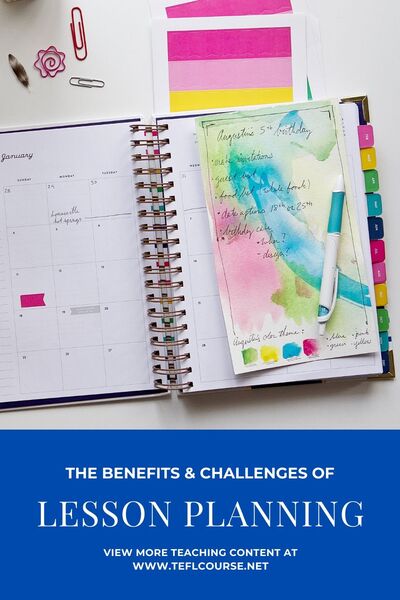The Benefits and Challenges of Lesson Planning

When teaching English as a foreign language, teachers need to create lesson plans. Lesson plans not only to help the teacher succeed in teaching her students but also helps the students learn the language more effectively. With lesson planning, teachers can set goals for students, stay organized when teaching, and learn how to be flexible when it comes to spending more time on a topic than previously predicted.
Table of Contents
Lesson planning offers the teacher and the students structure within the classroom.
Lesson planning offers teachers a detailed record of what has been taught in class.
Do you want to teach English abroad? Take a TEFL course!
This post was written by our TEFL certification graduate Brittany L. Please note that this blog post might not necessarily represent the beliefs or opinions of ITTT.
Lesson planning offers the teacher and the students structure within the classroom.
Each lesson should include goals of what the teacher wishes her students to accomplish during that class session. This can include learning new vocabulary, understanding a certain verb tense, or structuring a sentence. When there are clear goals set, the students know what they need to focus on during that lesson.
Also Read: The 8 Best Classroom Tools Every Teacher Should Use
The choice of activities
One challenge of creating lesson plans for a teacher is not to pack too many activities into one lesson and overwhelm the students. It's important to stay flexible and leave room in lesson plans to focus on specific problems the students are facing. This means that teachers cannot plan an entire semester or year at once. Instead, she should plan her lessons weekly so she can accommodate any challenges her students may have. It's important to note that it is acceptable for teachers not to complete everything in their lesson plans. This is where flexibility comes in. It is better to have too much planned and carry it over into the next class than not enough planned that there is an empty time slot at the end of the lesson that the teacher must fill on the spot. One detail some teachers may not consider before deciding to become a TEFL teacher is that lesson planning takes place outside of the classroom, which means they are working more hours than when they are teaching in front of a class.
Rapport
When a teacher creates lesson plans, it helps build rapport with her students because she is always organized and has activities planned out already. This shows that she is dedicated to teaching her students and takes time to consider how she wants to teach her students. It also gives the class some structure, so students aren't always wondering what their class will be each day. When they can expect a routine, such as an ESA lesson, they can spend more time focusing on the activities and lessons rather than wondering what they will do next. However, it is important to keep the class interesting and not too predictable, which can result in students becoming bored.
Also Read: The Cultural Problem for Learners in an EFL Classroom in Morocco
Lesson planning offers teachers a detailed record of what has been taught in class.
While many teachers may think that they can recall what they have already taught and certain activities, it is easy to get confused or forget over a school year. This can also help teachers when it comes to planning cumulative reviews with the class.
Not only do lesson plans serve as a diary of sorts, but they also serve as a way for teachers to reflect and evaluate their students and teaching methods. After each lesson, a teacher should note any challenges the lesson presented and how she can fix these challenges in the future. If students greatly enjoyed a certain activity, the teacher can then plan to use a similar activity in future lessons. While the students are learning a new language, the teacher is also learning the best strategies and methods to teach her students.
Do you want to teach English abroad? Take a TEFL course!
Lesson planning while teaching a foreign language is extremely important. It helps teachers stay organized and set goals for the students during each class. Being organized also builds rapport and trust with students, which results in them respecting teachers and paying better attention in class. Lesson plans also serve as a record of what has been taught, what students have struggled with, and what type of activities the class enjoyed doing. While lesson planning takes place outside of the classroom, all teachers must plan out their lessons.
Apply now & get certified to teach english abroad!
Speak with an ITTT advisor today to put together your personal plan for teaching English abroad!
Send us an email or call us toll-free at 1-800-490-0531 to speak with an ITTT advisor today.
Related Articles:
- TEFL Breakdown - What Subjects Will Your TEFL Course Cover?
- 5 Reasons Why Teaching English Abroad Enhances Your Career Prospects
- Top 5 Tips: How to Learn a New Language When Teaching English Abroad
- 4 Top Tips for Getting Your TEFL Certificate on the Road
- The How-To Guide for Americans to Teach English in Europe
- 5 Great Places to Teach English Abroad Without a Degree




